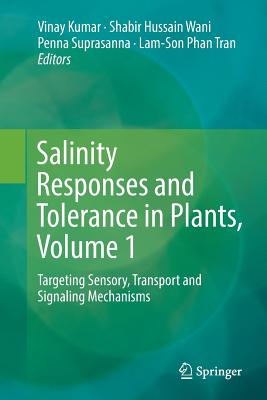Salinity Responses and Tolerance in Plants, Volume 1: Targeting Sensory, Transport and Signaling Mechanisms
暫譯: 植物的鹽度反應與耐受性,第1卷:針對感知、運輸與信號機制
Kumar, Vinay, Wani, Shabir Hussain, Suprasanna, Penna
- 出版商: Springer
- 出版日期: 2019-01-08
- 售價: $4,600
- 貴賓價: 9.5 折 $4,370
- 語言: 英文
- 頁數: 416
- 裝訂: Quality Paper - also called trade paper
- ISBN: 3030092941
- ISBN-13: 9783030092948
-
相關分類:
感測器 Sensor
海外代購書籍(需單獨結帳)
相關主題
商品描述
Soil salinity is a key abiotic-stress and poses serious threats to crop yields and quality of produce. Owing to the underlying complexity, conventional breeding programs have met with limited success. Even genetic engineering approaches, via transferring/overexpressing a single 'direct action gene' per event did not yield optimal results. Nevertheless, the biotechnological advents in last decade coupled with the availability of genomic sequences of major crops and model plants have opened new vistas for understanding salinity-responses and improving salinity tolerance in important glycophytic crops. Our goal is to summarize these findings for those who wish to understand and target the molecular mechanisms for producing salt-tolerant and high-yielding crops. Through this 2-volume book series, we critically assess the potential venues for imparting salt stress tolerance to major crops in the post-genomic era. Accordingly, perspectives on improving crop salinity tolerance by targeting the sensory, ion-transport and signaling mechanisms are presented here in volume 1. Volume 2 will focus on the potency of post-genomic era tools that include RNAi, genomic intervention, genome editing and systems biology approaches for producing salt tolerant crops.
商品描述(中文翻譯)
土壤鹽鹼度是主要的非生物壓力,對作物產量和產品品質構成嚴重威脅。由於其內在的複雜性,傳統育種計畫的成功有限。即使是透過轉移或過表達單一「直接作用基因」的基因工程方法,每次事件的結果也未能達到最佳效果。然而,過去十年生物技術的進展,加上主要作物和模式植物的基因組序列的可用性,為理解鹽分反應和提高重要的耐鹽作物的耐鹽性開啟了新的視野。我們的目標是總結這些發現,以便那些希望理解並針對產生耐鹽和高產作物的分子機制的人士。通過這套兩卷本的書籍系列,我們批判性地評估了在後基因組時代賦予主要作物耐鹽壓力的潛在途徑。因此,本卷將介紹通過針對感知、離子運輸和信號傳遞機制來改善作物耐鹽性的觀點。第二卷將專注於後基因組時代工具的潛力,包括RNAi、基因組干預、基因組編輯和系統生物學方法,以生產耐鹽作物。
作者簡介
Dr. Vinay Kumar is an Assistant Professor at the Post-graduate Department of Biotechnology, Progressive Education Society's Modern College of Arts, Science and Commerce, Ganeshkhind, Pune, India and a Visiting Faculty at the Department of Environmental Sciences, Savitribai Phule University, Pune, India. He obtained his Ph.D. in Biotechnology from Savitribai Phule Pune University (Formerly University of Pune) in 2009. For his Ph.D., he worked on metabolic engineering of rice for improved salinity tolerance. He has published 30 peer reviewed research/ review articles and contributed 10 book chapters in edited books published by Springer, CRC Press and Elsevier. He is a recipient of Government of India's Science and Engineering Board, Department of Science and Technology (SERB-DST) Young Scientist Award in 2011. His current research interests include elucidating molecular mechanisms underlying salinity stress responses and tolerance in plants. His research group is engaged in assessing the individual roles and relative importance of sodium and chloride ions under salinity stress in rice and made significant contributions in elucidating the individual and additive effects of sodium and chloride ions.
Dr. Shabir H. Wani is an Assistant Professor cum Scientist at the Mountain Research Centre for Field Crops, Khudwani Sher-e-Kashmir University of Agricultural Sciences and Technology of Kashmir, Srinagar, Jammu and Kashmir, India. He has published more than 100 papers/chapters in peer reviewed journals, and books of international and national repute. He is Review Editor of Frontiers in Plant Sciences, Switzerland. He is editor of SKUAST Journal of Research, and LS: An International journal of Life Sciences. He has also edited ten books on current topics in crop improvement published by CRC press, Taylor and Francis Group, USA and Springer. His Ph.D research fetched the first prize in North zone at national level competition in India. He is the fellow of the Linnean Society of London and Society for Plant Research, India. He was awarded with various awards including Young Scientist Award (Agriculture) 2015, Young Scientist Award 2016, Young Achiever award 2016 by various prestigious scientific societies. He has also worked as visiting Scientist in the Department of Plant Soil and Microbial Sciences, Michigan State University, USA for the year 2016-17 under the Raman Post Doctoral Research Fellowship programme sponsored by University Grants Commission, Govt. of India, New Delhi. He is a member of the Crop Science Society of America.
Dr. P. Suprasanna (Ph.D. Genetics, Osmania University, Hyderabad) is a Senior Scientist and Head of Plant Stress Physiology & Biotechnology Group in the Nuclear Agriculture & Biotechnology Division, Bhabha Atomic Research Centre, Mumbai, India. Dr. Suprasanna made significant contributions to crop biotechnology research through radiation induced mutagenesis, plant call & tissue culture, genomics and abiotic stress tolerance. His research on radiation-induced mutagenesis and in vitro selection in sugarcane yielded several agronomically superior mutants for sugar, yield and stress tolerance. He has made intensive efforts to apply radiation mutagenesis techniques in vegetatively propagated plants through collaborative research projects. He is actively associated with several national and international bodies (IAEA, Vienna) in the areas of radiation mutagenesis, plant biotechnology and biosafety. He is the recipient of the "Award of Scientific & Technical Excellence" by the Department of Atomic Energy, Govt. of India and is the Fellow, Maharashtra Academy of Sciences, Andhra Pradesh Academy of Sciences, Telangana Academy of Sciences, Fellow, Association of Biotechnology, and Faculty Professor, Homi Bhabha National Institute, DAE. Dr. Suprasanna has published more than 225 research papers/articles in national & international journals and books. His research is centred on molecular understanding of abiotic stress (salinity, drought and arsenic) tolerance, and salt-stress adaptive mechanism in halophytic plants. The research group led by him on crop genomics has successfully identified novel microRNAs, early responsive genes besides validating the concept of redox regulation towards abiotic stress tolerance and plant productivity.
Dr. Lam-Son Phan Tran is Head of the Signaling Pathway Research Unit at RIKEN Center for Sustainable Resource Science, Japan. He obtained his M.Sc. in Biotechnology in 1994 and Ph.D. in Biological Sciences in 1997, from Szent Istvan University, Hungary. After doing his postdoctoral research at the National Food Research Institute (1999-2000) and the Nara Institute of Science and Technology of Japan (2001), in October 2001, he joined the Japan International Research Center for Agricultural Sciences to work on the functional analyses of transcription factors and osmosensors in Arabidopsis plants under environmental stresses. In August 2007, he moved to the University of Missouri-Columbia, USA as a Senior Research Scientist to coordinate a research team working to discover soybean genes to be used for genetic engineering of drought-tolerant soybean plants. His current research interests are elucidation of the roles of phytohormones and their interactions in abiotic stress responses, as well as translational genomics of legume crops with the aim to enhance crop productivity under adverse environmental conditions. He has published over 125 peer-reviewed papers with more than 90 research and 35 review articles, contributed 8 book chapters to various book editions published by Springer, Wiley-Blackwell, and American Society of Agronomy, Crop Science Society of America and Soil Science Society of America. He has also edited 11 book volumes, including this one, for Springer and Elsevier.
作者簡介(中文翻譯)
Dr. Vinay Kumar 是印度浦那甘尼什金德進步教育學會現代藝術、科學與商業研究所生物技術研究所的助理教授,以及印度浦那薩維特里拜·普雷大學環境科學系的訪問教員。他於2009年在薩維特里拜·普雷浦那大學(前身為浦那大學)獲得生物技術博士學位。在他的博士研究中,他專注於水稻的代謝工程,以提高其耐鹽性。他已發表30篇經過同行評審的研究/綜述文章,並為由Springer、CRC Press和Elsevier出版的編輯書籍貢獻了10章。他是2011年印度政府科學與工程委員會(SERB-DST)年輕科學家獎的獲得者。他目前的研究興趣包括闡明植物在鹽分胁迫下的分子機制及其耐受性。他的研究小組致力於評估鈉和氯離子在水稻鹽分胁迫下的個別作用及相對重要性,並在闡明鈉和氯離子的個別及加成效應方面做出了重要貢獻。
Dr. Shabir H. Wani 是印度查謨和克什米爾的庫德瓦尼謝爾-克什米爾農業科學與技術大學山地作物研究中心的助理教授兼科學家。他在國際和國內知名的同行評審期刊及書籍上發表了超過100篇論文/章節。他是瑞士《植物科學前沿》的審稿編輯,也是SKUAST研究期刊和《生命科學國際期刊》的編輯。他還編輯了十本有關作物改良的當前主題的書籍,這些書籍由CRC Press、Taylor and Francis Group(美國)和Springer出版。他的博士研究在印度的全國性比賽中獲得北區第一名。他是倫敦林奈學會和印度植物研究學會的會員。他曾獲得多個獎項,包括2015年年輕科學家獎(農業)、2016年年輕科學家獎和2016年年輕成就獎,這些獎項由多個知名科學學會頒發。他還曾在2016-17年期間,作為訪問科學家在美國密西根州立大學植物土壤與微生物科學系工作,該計劃由印度新德里大學資助的拉曼博士後研究獎學金計劃支持。他是美國作物科學學會的成員。
Dr. P. Suprasanna(印度海得拉巴奧斯曼尼亞大學遺傳學博士)是印度孟買巴巴原子研究中心核農業與生物技術部門植物壓力生理學與生物技術小組的高級科學家及負責人。Dr. Suprasanna在作物生物技術研究方面做出了重要貢獻,通過輻射誘導突變、植物細胞與組織培養、基因組學和非生物胁迫耐受性。他在甘蔗的輻射誘導突變和in vitro選擇方面的研究產生了幾個在糖、產量和耐受性方面優越的突變體。他在通過合作研究項目將輻射突變技術應用於無性繁殖植物方面做出了大量努力。他積極參與多個國內外機構(如國際原子能機構,維也納)在輻射突變、植物生物技術和生物安全領域的工作。他是印度政府原子能部門頒發的「科學與技術卓越獎」的獲得者,也是馬哈拉施特拉科學學院、安得拉邦科學學院、特倫甘納邦科學學院的院士,以及生物技術協會的院士和霍米·巴巴國立學院的教授。Dr. Suprasanna在國內外期刊和書籍上發表了超過225篇研究論文/文章。他的研究集中在非生物胁迫(鹽分、乾旱和砷)耐受性的分子理解,以及鹽胁迫適應機制在鹽生植物中的應用。他所領導的作物基因組學研究小組成功識別了新型微小RNA和早期反應基因,並驗證了氧化還原調控在非生物胁迫耐受性和植物生產力中的概念。
Dr. Lam-Son Phan Tran 是日本RIKEN可持續資源科學中心信號通路研究單位的負責人。他於1994年獲得生物技術碩士學位,並於1997年獲得生物科學博士學位,均來自匈牙利聖伊什特萬大學。在1999-2000年期間,他在國家食品研究所進行博士後研究,並於2001年在日本奈良科學技術大學工作。2001年10月,他加入日本國際農業科學研究中心,研究在環境胁迫下阿拉伯芥植物中轉錄因子和滲透感應器的功能分析。2007年8月,他轉至美國密蘇里大學哥倫比亞分校擔任高級研究科學家,協調一個研究團隊,致力於發現可用於基因工程的抗旱大豆基因。他目前的研究興趣包括闡明植物激素及其在非生物胁迫反應中的相互作用,以及豆類作物的轉譯基因組學,旨在提高作物在不利環境條件下的生產力。他已發表超過125篇經過同行評審的論文,其中包括90篇研究文章和35篇綜述文章,並為由Springer、Wiley-Blackwell、美國農藝學會、作物科學學會和土壤科學學會出版的各種書籍貢獻了8章。他還編輯了11本書籍,包括這本書,為Springer和Elsevier出版。





























